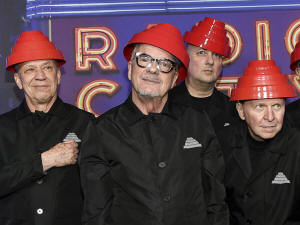The story behind Devo’s ‘Whip It’ and their misunderstood legacy
[August 19, 2025]
By MARK KENNEDY
NEW YORK (AP) — You know the band Devo, right? The guys with the funny
red plastic hats and jumpsuits? The New Wave musicians behind the silly
“Whip It” video? They had that odd, spiky '80s vibe? Well, it turns out
you may not know as much as you think.
The new Netflix documentary “Devo” is an eye-opening examination of an
Ohio-born art-rock band that argues they were perhaps the most
misunderstood band on the face of the planet. It debuts on the streaming
service Tuesday.
“We were trivialized and pigeonholed,” co-founder Gerald Casale tells
The Associated Press. “This documentary allows us to talk about what we
were thinking and what we are motivated by to create what we created.”
Directed by Chris Smith, “Devo” uses archival footage and interviews to
trace the band's beginnings, rise and fall, with cameos from fans like
David Bowie, Iggy Pop and Neil Young.
‘What we saw was regression’
Devo introduced themselves to the world in 1977 by making a frenetic
version of the Rolling Stones’ “I Can’t Get No) Satisfaction,” which
earned them a crucial slot on “Saturday Night Live.” On stages, they
would wriggle like worms or dress like the guys from “Ghostbusters.”
They released their Brian Eno-produced debut, “Q: Are We Not Men? A: We
Are Devo!,” in 1978 and reached platinum status with 1980’s “Freedom of
Choice,” which featured “Whip It,” a hit just as their label was getting
ready to drop them.
But behind the odd neck braces and knee pads were powerful art and
literary ideas about where the country was going. They named themselves
after the idea that modern society was entering a process of
“devolution.”

“We were seeing a world that was the antitheses of the idealized,
promised future ginned up in the ’50s and ’60s.” Casale says in the
movie. “What we saw was regression.”
The nucleus of the band was formed from tragedy: Casale and Mark
Mothersbaugh met at Kent State University, where they lived through the
1970 killing of four unarmed anti-war student protesters by the National
Guard.
That tragedy forged in the pair an antiestablishment, anti-capitalist
protest, mixing lofty art history with pop culture. They admired Dadaism
and Andy Warhol. The factories of Akron inspired their gray overalls and
clear plastic face masks — portraying cogs in a machine like in the art
movie “Metropolis.”
“We had a meta-approach,” Casale tells the AP. “It was a multimedia, big
idea approach. Music was an element, a layer, a dimension, but it was
connected to this big worldview.”
‘Whip It’ video
Part of Devo's strength was its visual component and their videos were
drenched with political commentary. The upbeat “Beautiful World”
featured footage of police violence, the KKK and bombings, while
“Freedom of Choice” warned against the dangers of conformity.
The song “Whip It” was written after reading Thomas Pynchon’s 760-page
postmodern sci-fi tome “Gravity’s Rainbow.” The video — featuring
cowboys drinking beer, dangerous gunplay and assault — was actually
mocking President Ronald Reagan and his macho brand of conservatism.
[to top of second column]
|

Bob Mothersbaugh, from left, Mark Mothersbaugh, Josh Hager, Gerald
Casale from Devo attend the SNL50: The Homecoming Concert on Feb.
14, 2025, in New York. (Photo by Evan Agostini/Invision/AP, File)

Members of Devo — which also included Mark's brother, Bob, Gerald's
brother, Bob, and Alan Myers — performed on TV and chatted with talk
show hosts like David Letterman but their satire never seemed never to
break through.
“Nobody wanted to hear us talking about the duality of human nature and
the dangers of groupthink and the atrophication of people being able to
think logically and think critically,” Casale says. “It was like,
‘That’s a bummer. Just tell us about drugs and sex.’”
A counterculture legacy
Rock has always needed bands like Devo, a corrective to the corporate
machine. You can see an echo of Devo when M.I.A. raised her middle
finger during the Super Bowl halftime show in 2012. The members of Devo
cite such bands as Rage Against the Machine and System of a Down as
keeping the flame alive.
“The only thing you can hope is that it will create an awareness and get
rid of complacency, but it doesn’t seem to have done that in the past,”
Mothersbaugh tells the AP.
“I always tried to be optimistic that devolution was something that was
going to be corrected and that our message would be not necessary at
this point, but unfortunately it’s more real than ever.”
After Devo, Casale directed music videos and commercials, while
Mothersbaugh scored movies and TV shows such as “Pee-Wee’s Playhouse,”
“The Life Aquatic with Steve Zissou,” “Rugrats” and “Hello Tomorrow!”
There are signs of optimism when members of Devo play live these days.
Mothersbaugh says he sees a lot of young people, who have used their
smartphones to bypass media gatekeepers.
“We see a lot of people that look like us, with gray hair out there in
the audience. But there’s also, there’s also a lot kids, which is kind
of surprising to me, but I think it’s only because they have this thing
in their hand that they sometimes use to their advantage.”

Devo are set to hit the road later this year in a co-headlining tour
with the B-52's. The Cosmic De-Evolution Tour will kick off Sept. 24 in
Toronto and wraps Nov. 2 in Houston.
You may think of Devo as New Wave or early electronica or synth-pop. but
they see themselves differently: “We were true punk, meaning we
questioned illegitimate authority and we stayed in our own lane and did
our thing, remaining true to our vision,” says Casale. “That’s punk.”
All contents © copyright 2025 Associated Press. All rights reserved |